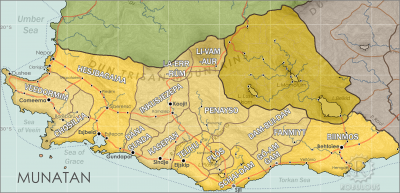Kamasep
Kamasep is a city in the nation of Inkusjezepa in Munatan. During the Ennseperan Empire it was the colonial capital, and still remains the hub for trade, being at the end of only two decent roads in the country. After independence the capital was moved to Koojit.
Munatanplugin-autotooltip__small plugin-autotooltip_bigMunatan (Category)
Articles about Munatan, the far southern region of Anásthias.
Nations
Cities
topics regi1
 Hover mouse to see more detail | Go to full atlas mapplugin-autotooltip__small plugin-autotooltip_bigAtlas: Munatan
Hover mouse to see more detail | Go to full atlas mapplugin-autotooltip__small plugin-autotooltip_bigAtlas: Munatan
[munatan.png] * Zoom out * East Munatan * West Munatan
Munatan
Munatan [Moo-Nah-Tahn] is the southernmost region of Anásthias, south of the Dun Trisan mountains. The name possibly derives from a ancient OrorrOrorrOrorrHartheraHartheraOrorrOrorrOrorrHartheraHartheraHartheran
This is in a series of articles about Munatanplugin-autotooltip__small plugin-autotooltip_bigMunatan
Munatan [Moo-Nah-Tahn] is the southernmost region of Anásthias, south of the Dun Trisan mountains. The name possibly derives from a ancient Thalsic, meaning “Land of One Sun”, since the daystar is not visible in the southern hemisphere. Or it may be a reference to the Manthi people who were once the majority population of western Munatan. The term is an OrorrOrorrOrorrHartheraHartheraOrorrOrorrOrorrHartheraHartheraHartheran, the temperate region of southern Anásthiasplugin-autotooltip__small plugin-autotooltip_bigAnásthias
Anásthias [a-NAS-thee-ass / ænæsθiːæs], or [an-ass-THEE-as] is an equatorial island continent, heart of the Civilised World. The north straddles the equator and is hot and humid, while most of the equatorial centre is an upland plateau with fertile river valleys, and stretches of arid plains and desert in the shadow of the mountains. The south is temperate but more wild, separated from the civilisations of the north by the almost impassable Harthera.
The city is built in Ennseperan style with characteristic houses of wood and brick on a grid of streets, unlike the more sprawling and haphazard style of traditional Inkusz settlements.